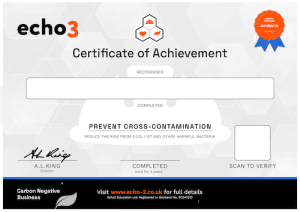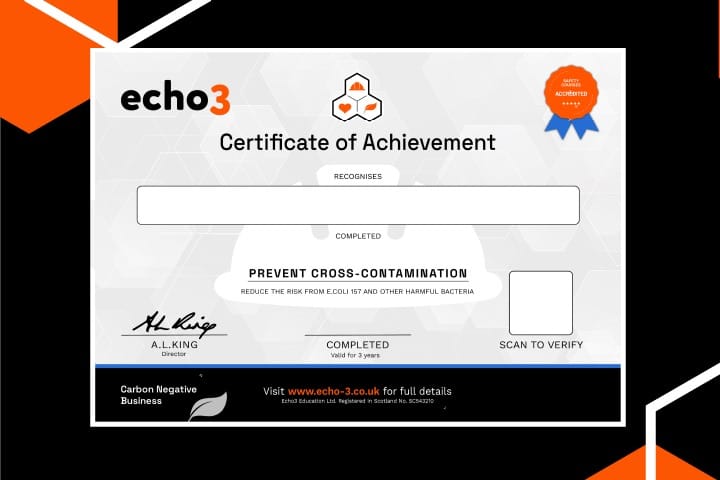Your basket is currently empty!

Preventing Cross-contamination
Preventing cross-contamination online course providing the knowledge food business operators need to protect consumers from allergen hazards.
- For Me
- For Teams
PREVENTING CROSS-CONTAMINATION
Cross-contamination is one of the most common causes of food poisoning. It happens when harmful bacteria are spread onto food from another source.
You have most likely heard of E. Coli 0157. E. Coli is a particularly harmful bacterium, especially for young and elderly, that can survive refrigeration, freezing plus it tolerates acidic, salty and dry conditions.
So, if your food business handles both raw and ready-to-eat (RTE) foods you need to put in place measures to prevent the spread of bacteria particularly E.Coli 0157.
COURSE OBECTIVE
The Preventing Cross-Contamination course is based on guidance from Food Standards Scotland (April 2017), which details the practical steps food business must undertake in order to comply with the provisions laid down in EU Regulation 178/2002.
The course is designed to help you and your staff understand the importance of controlling cross-contamination and the steps to prevent cross-contamination. The course also helps employers fulfil mandatory requirements for training (or instruction) on safe methods.
COURSE SYLLABUS
UNIT 1 | E. Coli 0157 Health Risks
What is E. Coli 0157?
Where does E. coli 0157 occur?
What are the associated health risks?
What is cross-contamination?
UNIT 2 | Preventing Cross-Contamination
Separation
Cleaning & Disinfection
Personal Hygiene & Handling Practice
UNIT 3 | Good Practice
Management Controls
Training
WHO IS THIS COURSE FOR
This course is ideal for all food handlers and food business operators that work in businesses that handle both raw and ready-to-eat foods.
Staff must be instructed or trained in all safe methods that are relevant to the job they do. Because preventing cross-contamination is such a vital part of food safety every food handler needs to understand recent guidance for Food Standards Scotland (April 2017) and the Food Standards Agency (March 2018).
So if you are a food handler who has completed the Level 2 Food Hygiene certificate this course is relevant to you.
CROSS-CONTAMINATION CERTIFICATE
Once you have achieve over 80% in the short 10 question final assessment you will be emailed your PDF certificate. The is no limit to the number of assessment retakes. You also have the option at the end of the course to receive a posted version of the certificate (£9)

WHAT TAKE THIS COURSE
The food hygiene legislation requires Food Business Operators (FBOs) to put in place food safety management procedures based on the HACCP principles. This is a broader topic this is covered in our HACCP course.
Food Business Operators (FBOs) must ensure that food handlers are supervised and instructed and/or adequately trained to understand the importance of food hygiene matters in line with their work activity.
Training/instruction should cover the importance of separation of raw and RTE foods, the importance of personal hygiene, in particular effective hand washing and the hazards associated with inadequate cleaning and disinfection. All staff involved in cleaning procedures need to be trained to ensure they are competent before being asked to undertake heat or chemical disinfection.
TRAINING INCLUDES
- 30 minutes of quality online training
- Fully accredited training
- Quizzes to train what you’ve learned
- Certificate emailed on successful completion
- Carbon Net Zero product
- Access for 1 year
FURTHER INFORMATION
Food Standards Scotland have taken the lead for the UK in publishing guidance to food business operators on the application of Regulation (EC) No 852/2004. The guidance communicates what FBO’s need to do in practice.
Food Standards Scotland Guidance – [External Link]
Food Standards Agency Guidance (UK) – [External Link]
E.Coli 0157 outbreak – BBC Scotland – [External Link]
Given every business is different operators need to undertake a risk assessment on site to decide the controls necessary to minimise the risk of cross-contamination and ensure food safety. This course is one way to provide training to your staff in order to improve food safety.
PREVENTING CROSS-CONTAMINATION
Cross-contamination is one of the most common causes of food poisoning. It happens when harmful bacteria are spread onto food from another source.
You have most likely heard of E. Coli 0157. E. Coli is a particularly harmful bacterium, especially for young and elderly, that can survive refrigeration, freezing plus it tolerates acidic, salty and dry conditions.
So, if your food business handles both raw and ready-to-eat (RTE) foods you need to put in place measures to prevent the spread of bacteria particularly E.Coli 0157.
COURSE OBECTIVE
The Preventing Cross-Contamination course is based on guidance from Food Standards Scotland (April 2017), which details the practical steps food business must undertake in order to comply with the provisions laid down in EU Regulation 178/2002.
The course is designed to help you and your staff understand the importance of controlling cross-contamination and the steps to prevent cross-contamination. The course also helps employers fulfil mandatory requirements for training (or instruction) on safe methods.
COURSE SYLLABUS
UNIT 1 | E. Coli 0157 Health Risks
What is E. Coli 0157?
Where does E. coli 0157 occur?
What are the associated health risks?
What is cross-contamination?
UNIT 2 | Preventing Cross-Contamination
Separation
Cleaning & Disinfection
Personal Hygiene & Handling Practice
UNIT 3 | Good Practice
Management Controls
Training
WHO IS THIS COURSE FOR
This course is ideal for all food handlers and food business operators that work in businesses that handle both raw and ready-to-eat foods.
Staff must be instructed or trained in all safe methods that are relevant to the job they do. Because preventing cross-contamination is such a vital part of food safety every food handler needs to understand recent guidance for Food Standards Scotland (April 2017) and the Food Standards Agency (March 2018).
So if you are a food handler who has completed the Level 2 Food Hygiene certificate this course is relevant to you.
CROSS-CONTAMINATION CERTIFICATE
Once you have achieve over 80% in the short 10 question final assessment you will be emailed your PDF certificate. The is no limit to the number of assessment retakes. You also have the option at the end of the course to receive a posted version of the certificate (£9)

WHAT TAKE THIS COURSE
The food hygiene legislation requires Food Business Operators (FBOs) to put in place food safety management procedures based on the HACCP principles. This is a broader topic this is covered in our HACCP course.
Food Business Operators (FBOs) must ensure that food handlers are supervised and instructed and/or adequately trained to understand the importance of food hygiene matters in line with their work activity.
Training/instruction should cover the importance of separation of raw and RTE foods, the importance of personal hygiene, in particular effective hand washing and the hazards associated with inadequate cleaning and disinfection. All staff involved in cleaning procedures need to be trained to ensure they are competent before being asked to undertake heat or chemical disinfection.
TRAINING INCLUDES
- 30 minutes of quality online training
- Fully accredited training
- Quizzes to train what you’ve learned
- Certificate emailed on successful completion
- Carbon Net Zero product
- Access for 1 year
FURTHER INFORMATION
Food Standards Scotland have taken the lead for the UK in publishing guidance to food business operators on the application of Regulation (EC) No 852/2004. The guidance communicates what FBO’s need to do in practice.
Food Standards Scotland Guidance – [External Link]
Food Standards Agency Guidance (UK) – [External Link]
E.Coli 0157 outbreak – BBC Scotland – [External Link]
Given every business is different operators need to undertake a risk assessment on site to decide the controls necessary to minimise the risk of cross-contamination and ensure food safety. This course is one way to provide training to your staff in order to improve food safety.





